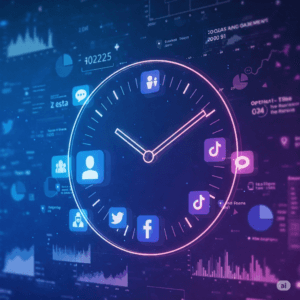Best Times to Post on Social Media in 2025: Unlock the Magic of Perfect Timing

If you’ve ever poured your heart into creating the perfect social media post — only to watch it get buried in the endless scroll — you’re not alone. Social media algorithms in 2025 are smarter, more complex, and frankly, a little unpredictable. But here’s the good news: timing your posts right can still be the secret sauce to maximizing reach, engagement, and followers.
Why Timing Still Matters
Social media platforms have evolved to prioritize content that sparks immediate engagement. The first few minutes after you post? Critical. If your post gets liked, shared, or commented on quickly, algorithms take note and push it to more feeds. That means posting when your audience is actually online is more important than ever.
Here’s the catch: “when your audience is online” isn’t some static number anymore. It shifts based on global trends, remote work schedules, time zones, and even emerging platforms competing for eyeballs.
So, what’s the game plan for 2025? Let’s dive into the data-backed sweet spots for posting across the major platforms.
Facebook: Catch the Afternoon Energy Wave
Despite the rise of newer platforms, Facebook remains a powerhouse — especially for brands targeting Gen X and Boomers.
Best days: Wednesday, Thursday, Friday
Peak hours: 1 PM to 4 PM local time
Why? Mid-afternoon posts catch people during work breaks or those afternoon slumps when they sneak a quick scroll. Avoid weekends unless your content is highly engaging or event-driven.
Instagram: Early Mornings and Evenings Rule
Instagram’s aesthetic appeal is stronger than ever, and it’s a go-to for Gen Z and Millennials who check it multiple times a day.
Best days: Tuesday, Wednesday, and Friday
Peak hours: 7 AM to 9 AM and 7 PM to 9 PM
Why? Morning posts catch early risers and people checking their phones as they wake up. Evening posts capitalize on downtime after work or school. Instagram Stories see a lot of activity around lunchtime too, so consider spacing content throughout the day.
Twitter: Hit the Morning Rush
Twitter thrives on real-time news, trends, and quick conversations.
Best days: Monday to Friday
Peak hours: 8 AM to 10 AM and 6 PM to 9 PM
Why? Morning posts reach users who check news updates before starting their day. Evening activity spikes as people unwind and catch up on trending topics. Weekends tend to see lower engagement unless it’s breaking news or live event coverage.
LinkedIn: Midweek Mornings for Professionals
For B2B brands and professionals, LinkedIn continues to be the networking hub.
Best days: Tuesday, Wednesday, Thursday
Peak hours: 8 AM to 10 AM and 12 PM to 2 PM
Why? People check LinkedIn before the workday kicks into full gear and around lunch breaks. Engagement drops off dramatically on Fridays and weekends — so save those posts for other platforms.
TikTok: Anytime There’s a Trend
TikTok’s rapid-fire, highly engaging content means timing can be more flexible but still strategic.
Best days: Tuesday, Thursday, Friday
Peak hours: 6 AM to 10 AM and 7 PM to 11 PM
Why? Early mornings and late evenings capture when users are most likely to binge-watch videos. TikTok’s “For You” page algorithm is powerful, but early engagement can boost reach dramatically.
Pro Tips for 2025 Social Media Timing
Use platform insights: All major platforms offer analytics that show when your followers are most active. Use these tailored insights to finetune your posting schedule.
Test & adapt: There’s no one-size-fits-all. Your audience might be night owls or early birds — experiment with different times and track engagement.
Leverage automation: Scheduling tools like Buffer, Later, or Hootsuite are essential. They free you to post at peak times without being glued to your phone.
Don’t ignore micro-moments: Stories, Reels, and Fleets get a ton of views within a few hours. Spread these throughout the day rather than all at once.
Final Thoughts
The “perfect” time to post isn’t set in stone — it’s an evolving target influenced by changing lifestyles and platform tweaks. But by aligning your content calendar with when your audience is most active, you dramatically increase your chances of standing out in a sea of content.
In 2025, social media success isn’t just about what you post — it’s when you post.
So, set your timers, plan your calendar, and watch your engagement skyrocket.
